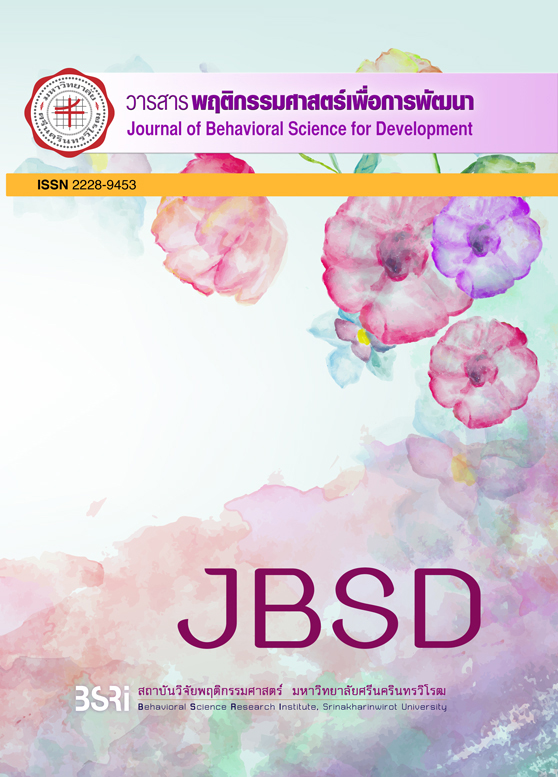Family and Educational Institution Situations and Psychological Characteristic Related to Ethical Behaviors of Undergraduate Students
Abstract
ปัจจัยทางด้านสถานการณ์ในครอบครัว สถาบันการศึกษา และจิตลักษณะที่เกี่ยวข้องกับพฤติกรรมจริยธรรมในการเรียนของนิสิตระดับปริญญาตรี
Abstract
This research aims to develop the casual structural model of ethical behaviors of Srinakharinwirot University’s undergraduate students. The samples of this research are 617 junior students from 3 different fields of study (Health Science, Science and Technology and Sociology) enrolling in the university’s 2012’s second semester. The data is collected using 10 different instruments; each has the range of internal consistency reliability coefficient from .782 to .897 The researcher employs Casual structural Models with Latent Variable from LISREL application for the data analysis process. The resultant analyzed data reveals that the model of ethical behaviors of Srinakharinwirot University’s undergraduate students were consistent with the empirical data. It is also found that socialization from family, social support from teacher and ethical rationale, future orientation and self-control, and achievement motivation, can be used, collectively, to explain the students’ attitudes towards responsible behaviors (the obtained result is 63 percent). The data also shows that socialization from family, social support from teacher and ethical rational, future orientation, self-control, and achievement motivation and attitudes towards responsible behaviors can be used to forecast 79 percent of students’ ethical behaviors.
Keywords: Socialization from Family, Social Support from Teacher, Psychology Characteristics, Ethical Behaviors
บทคัดย่อ
การวิจัยครั้งนี้มีจุดมุ่งหมายเพื่อพัฒนาแบบจำลองโครงสร้างความสัมพันธ์เชิงสาเหตุของพฤติกรรมจริยธรรมในการเรียนของนิสิตระดับปริญญาตรี มหาวิทยาลัยศรีนครินทรวิโรฒ กลุ่มตัวอย่างในการวิจัยครั้งนี้คือ นิสิตระดับปริญญาตรี ชั้นปีที่ 3 ภาคเรียนที่ 2 ปีการศึกษา 2555 ที่เรียนใน 3 สาขาวิชาประกอบด้วย วิทยาศาสตร์สุขภาพ วิทยาศาสตร์และเทคโนโลยี และสังคมศาสตร์ จำนวน 617 คน ที่ได้จากการสุ่มตัวอย่างแบบหลายขั้นตอน (Multi-stage Random Sampling) เก็บข้อมูลจากแบบสอบถามที่มีค่าความเชื่อมั่นระหว่าง .782 - .897 วิเคราะห์ข้อมูลด้วยโปรแกรม LISREL ผลการวิจัยพบว่า แบบจำลองพฤติกรรมจริยธรรมในการเรียนของนิสิตระดับปริญญาตรี มหาวิทยาลัยศรีนครินทรวิโรฒ มีความกลมกลืนกับข้อมูล เชิงประจักษ์ โดยพบว่าการถ่ายทอดทางสังคมจากครอบครัว การสนับสนุนทางสังคมจากครูอาจารย์ เหตุผลเชิงจริยธรรม ลักษณะมุ่งอนาคตควบคุมตน และแรงจูงใจใฝ่สัมฤทธิ์ สามารถร่วมกันอธิบายเจตคติต่อพฤติกรรมจริยธรรมในการเรียนได้ร้อยละ 63 และพบว่าการถ่ายทอดทางสังคมจากครอบครัว การส่งเสริมสนับสนุนของครูอาจารย์ เหตุผลเชิงจริยธรรม ลักษณะมุ่งอนาคตควบคุมตน แรงจูงใจใฝ่สัมฤทธิ์ และเจตคติต่อพฤติกรรมจริยธรรมสามารถร่วมกันทำนายพฤติกรรมจริยธรรมในการเรียนได้ ร้อยละ 79
คำสำคัญ: การถ่ายทอดทางสังคมจากครอบครัว การส่งเสริมสนับสนุนของครูอาจารย์ จิตลักษณะ พฤติกรรมจริยธรรมในการเรียน



